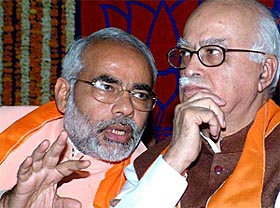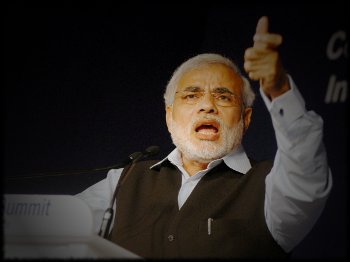A Divisive Indian Official Is Loved by Businesses
GANDHINAGAR, India — In a soaring, unfinished conference hall in western India, thousands of businessmen and diplomats from around the world gathered recently for an investment meeting. They were there to pay homage to a politician for accomplishing something once thought almost impossible in India: making it easy to do business.
Sam Panthaky/Agence France-Presse — Getty Images
Narendra Modi, chief minister of the state of Gujarat, spoke at a conference last month that was meant to promote business.
Bombardier
The Canadian company Bombardier built a manufacturing plant in Savli, Gujarat, in 18 months, “a world record within Bombardier,” one executive said.
The politician, Narendra Modi, the chief minister of the state of Gujarat, sat onstage, stroking his close-cropped white beard, as executives from the United States, Canada, Japan and elsewhere showered him with praise.
Ron Somers, head of an American trade group, called him a progressive leader. Michael Kadoorie, a Hong Kong billionaire, enveloped him in a hug.
“I would encourage you all to invest here,” Mr. Kadoorie, chairman of the Asian power company CLP Group, told the audience, “because it has been an even playing field for me.”
The coastal state of Gujarat, famous as the birthplace of Mahatma Gandhi, has become an investment magnet. The state’s gross domestic product is growing at an 11 percent annual rate — even faster than the overall growth rate for India, which despite its problems is zipping along at 9 percent clip.
And Mr. Modi receives — some would say claims — much of the credit. The year before he took office in 2001, Gujarat’s economy shrank by 5 percent.
But critics of Mr. Modi, a Hindu nationalist, point to another legacy of his early days in office — something that has made him one of the most polarizing figures in Indian politics. Months after he became chief minister, Gujarat erupted in brutal Hindu-Muslim riots that killed more than 1,000 people, most of them Muslims.
Despite Mr. Modi’s subsequent denials, he has not fully escaped a cloud of accusations by rival political groups, victims and their families, and human rights groups that he and his aides condoned the attacks against Muslims and — as one case now before the Supreme Court charges — may even have encouraged them.
A special investigation team formed by the Supreme Court has filed a 600-page investigative report on the riots, which has not been officially released. Numerous other lawsuits related to the riots are also winding through India’s courts. In 2005 the United States refused to grant Mr. Modi a visa, on grounds of religious intolerance. Meanwhile, environmental activists and local tribesman who have been protesting the construction of seven dams in Gujarat that will displace 25,000 people say they the protesters have been regularly jailed by the state police, charged with being Naxalites, a militant rebel group.
Mr. Modi, who has declined interview requests from The New York Times for several years, did not comment for this article.
Of the lingering controversies, a spokesman for Mr. Modi, Steven King, with the Washington public relations firm APCO Worldwide, wrote in an e-mail responding to questions: “The government has very highly developed grievance proceedings.”
Corporate executives, though, tend to concentrate on Mr. Modi’s pro-business attributes, which they see as something of an anomaly in an India where government bureaucracy, bumbling or corruption too often impedes commerce.
“In India there is a sense that efficiency is at such a premium because there is so little to go around,” said Eswar Prasad, a professor of trade policy at Cornell who has served as an adviser to the Indian government. “When people find an effective politician who can make things happen on the ground, they are willing to ignore the character flaws.”
Under Mr. Modi’s watch, the energy companies Royal Dutch Shell and Total have opened a major liquid natural gas terminal in Gujarat, and Torrent Power, an Indian company, has built a huge power plant. Meanwhile, Tata Motors, DuPont, General Motors, Hitachi and dozens of other foreign and Indian companies have built factories, expanded operations or invested in projects in the state.
When the Canadian heavy machinery company Bombardier won a contract to supply subway cars to the Delhi Metro in 2007, it needed a factory site, quickly. It found one in Savli, an industrial estate in Gujarat. Just 18 months later— when in many parts of India, the permit process might still be grinding away — the factory was built and operating.
“It was incredible,” said Rajeev Jyoti, the managing director of Bombardier in India, “and it was a world record within Bombardier.”
Compared with most other states, Gujarat has smoother roads and less garbage next to the streets. More than 99 percent of Gujarat’s villages have electricity, compared with less than 85 percent nationally.
In 2009, Gujarat attracted more planned investment than any other state in the country, about $54 billion by value of announced plans, according to Assocham, a trade association of Indian chambers of commerce.
Mr. Modi, who has no business or economics background, deserves praise for this, corporate leaders say. Before entering politics in his late 30s, he was a religious volunteer for the Hindu nationalist group Rashtriya Swayamsevak Sangh, which sponsors schools and provides aid during natural disasters, but has also been widely criticized as being intolerant of other religions and of secular Hindus.
In India, where corrupt politicians often seem to be raiding the public coffers to benefit their offspring, Mr. Modi’s success is sometimes attributed to his apparent lack of a family life. Acquaintances and local news reports say he was married at a young age but separated soon after from his wife. Mr. Modi has never commented on reports about his personal life.
Mr. Modi’s administration has brought novel solutions to some of India’s most tenacious problems. Corruption became less widespread after the state government put a large amount of its activities online, from permits that companies need to build or expand, to bids for contracts. To plow through a multiyear backlog of court cases, and prevent day laborers from losing income, Mr. Modi asked judges to work extra hours in night courts.















 Click to play video
Click to play video








